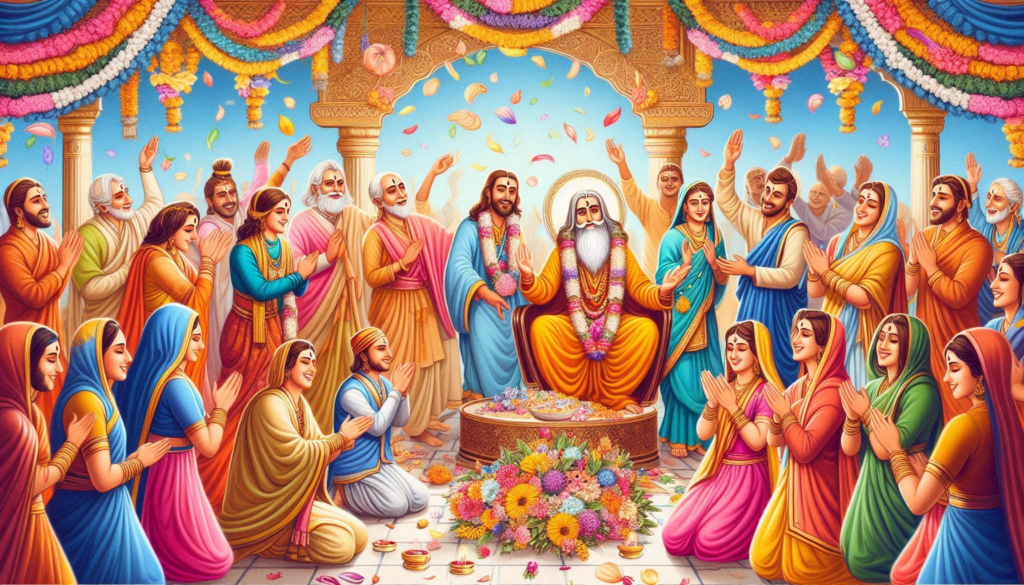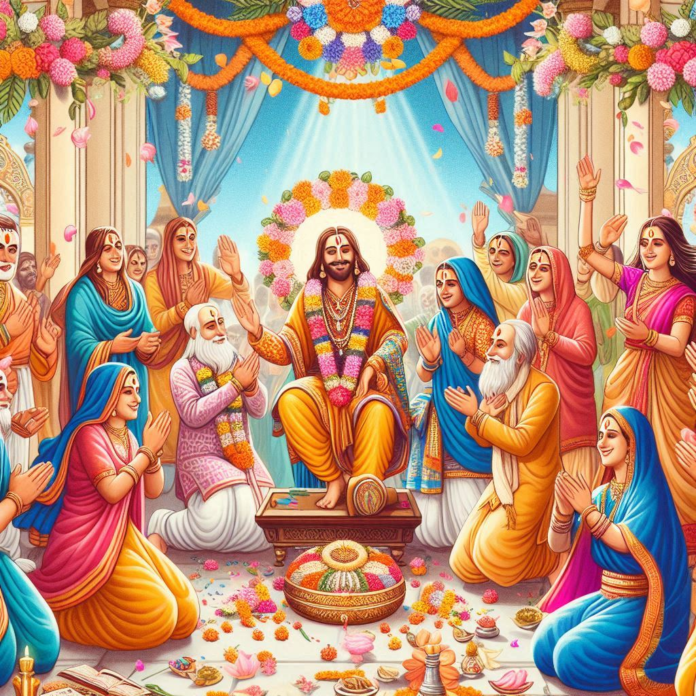Guru Purnima :
Guru Purnima, celebrated on the full moon day (Purnima) in the Hindu month of Ashadha (June-July), is a sacred festival that honors and expresses gratitude towards gurus, spiritual teachers, and mentors. It holds deep significance in various spiritual traditions, particularly in Hinduism, Buddhism, and Jainism, where the role of a guru or teacher is paramount in guiding individuals on their spiritual path and in the pursuit of knowledge.

Origin and Significance
The festival’s origin can be traced back to ancient times when disciples would gather to pay homage to their gurus and receive blessings. The word “Guru” is derived from Sanskrit, where “Gu” means ignorance or darkness, and “Ru” means dispeller or remover. Hence, a guru is someone who dispels the darkness of ignorance and brings enlightenment.
Hindu Tradition
In Hinduism, the guru is considered as important as God and one’s parents. The relationship between a guru and disciple is sacred and revered, embodying not only the transmission of knowledge but also personal transformationand spiritual guidance. Guru Purnima is a day when disciples express their gratitude and devotion to their gurus through various rituals, prayers, and offerings.
Buddhist Tradition
In Buddhism, Guru Purnima is also known as Dhamma Day. It commemorates the day when the Buddha gave his first sermon, known as the Dhammacakkappavattana Sutta, to his five ascetic disciples at Deer Park in Sarnath, near Varanasi. This sermon marked the beginning of the Buddhist Sangha (community of monks) and the spread of the Buddha’s teachings, known as the Dhamma.
Jain Tradition
In Jainism, Guru Purnima is celebrated in honor of Lord Mahavira’s spiritual journey towards enlightenment. Mahavira was the 24th Tirthankara (spiritual teacher) who revitalized Jainism and is revered as a guru who taught the path of non-violence (ahimsa), truthfulness (satya), and spiritual purity (brahmacharya).
Rituals and Traditions
Guru Purnima is observed with various rituals and traditions that vary across different regions and traditions:
Paying Homage: Disciples visit their gurus to seek blessings and express gratitude. They often offer flowers, fruits, and other symbolic gifts as a mark of respect.
Vedic Chanting and Prayers: Mantras and hymns are chanted to invoke auspiciousness and spiritual blessings. The Guru Gita, a sacred scripture praising the guru’s virtues, is recited on this day.
Satsang and Discourses: Spiritual discourses, teachings, and lectures are conducted by gurus or spiritual leaders to impart knowledge and inspire spiritual growth among disciples.
Feasting and Charity: Feasts or communal meals (prasadam) are organized where devotees partake in food blessed by their gurus. Acts and Charity of service are also emphasized as ways to honor the guru’s teachings.
Modern Observance
In contemporary times, Guru Purnima is celebrated not only in traditional settings like ashrams and temples but also in educational institutions, where teachers are revered for their role in shaping the minds and futures of students. It is a day to acknowledge all forms of teachers and mentors who impart knowledge and wisdom in various fields, including academics, arts, sports, and spirituality.
Philosophical Significance
Guru Purnima transcends religious boundaries and holds a universal philosophical significance:
Transmission of Knowledge: It symbolizes the sacred relationship between a teacher and a student, emphasizing the importance of learning, humility, and respect in the pursuit of knowledge.
Spiritual Awakening: The festival encourages introspection and self-improvement, inspiring individuals to seek inner wisdom and enlightenment under the guidance of a mentor.
Gratitude and Devotion: Guru Purnima reinforces the values of gratitude, humility, and devotion towards those who selflessly impart knowledge and guide others on their spiritual or academic journey.
Personal Reflection and Practice
For disciples and practitioners, Guru Purnima is a time for self-assessment and renewal of spiritual vows:
Selfless Service: Emulating the guru’s teachings by practicing selfless service (seva) and helping others in need.
Continued Learning: Committing to lifelong learning and personal growth by studying scriptures, attending lectures, and deepening one’s understanding of spiritual teachings.
Inner Transformation: Striving towards inner transformation by following ethical principles, cultivating virtues, and meditating on spiritual truths.
Conclusion
Guru Purnima is more than just a festival; it is a profound spiritual occasion that celebrates the timeless bond between a guru and disciple, teacher and student. It reminds us of the importance of knowledge, humility, and gratitude in our journey towards enlightenment and self-realization. Whether observed in temples, monasteries, or educational institutions, Guru Purnima continues to inspire millions to seek wisdom, follow ethical principles, and honor those who illuminate the path of knowledge and spiritual awakening.



